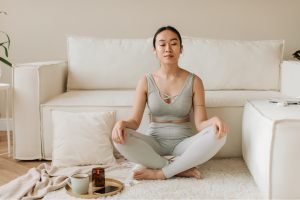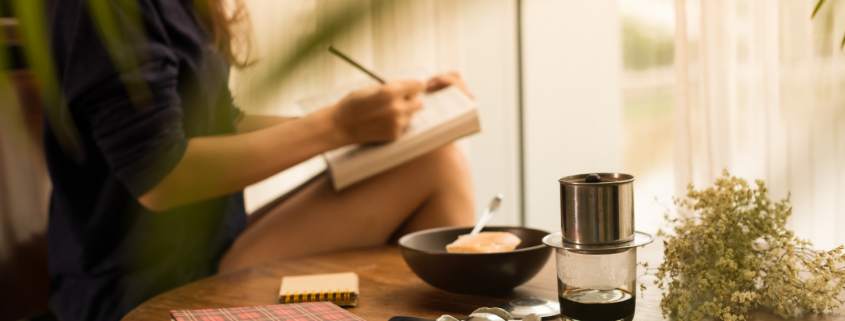Anxiety: Redefine Your Relationship With It
Anxiety: Redefine Your Relationship With It
By Jessica Baker RN, BSN, E-RYT 500, YTRX

So, What Really is Anxiety?
The American Psychological Association (APA) defines anxiety as “an emotion characterized by feelings of tension, worried thoughts, and physical changes like increased blood pressure.” Emotionally, anxiety can cause the thinking mind to feel like a hamster in a hamster wheel; round and round it goes. Physically, anxiety can make us feel nauseous, restless, tired, and even dizzy. Anxiety is an emotion that we all have experienced. So, know that you are not alone when this emotion creeps in. Anxiety is now the leading mental health problem around the world, and the incidence of anxiety is still rising.
But Did You Know Anxiety is an Activating Emotion?
Activating emotions are emotions that elicit a heightened state of arousal and energy. These emotions can also include excitement and anger. Heightened emotions can offer us new ways of thinking, boost creativity, and motivate us to perform. When we feel activated, we also tend to practice more cautious thinking which can make us great problem solvers! Think of that time you were invited by a friend to meet at a new coffee shop across town. You haven’t seen each other in quite a while, and you have so much to catch up on! But then almost at once, anxiety steps in and your thinking brain says: “What time will I need to leave to arrive on time, does this space offer outdoor seating, will I have to fight to find street parking?” Instead of retreating and choosing to cancel your plans, you quickly find yourself on google, search a few articles, and discover all the answers you need!
Can We Learn to Accept this Emotion?
Do not judge yourself for feeling anxious. It is only normal to want to rid ourselves of this uncomfortable feeling. However, this approach could actually increase our anxiety. Acknowledge the feeling either silently or aloud. “I see you, but I am not going to allow you to define this moment.” Having a gentle awareness will not magically make anxiety disappear, but it will lessen the intensity. It is OK to allow these feelings to co-exist within us. It is often said that those who have dealt with anxiety tend to be more empathetic and understanding to the issues others face. If we can be understanding of others, we must then be gentle with our own understanding of ourselves.

What Can We Do to Lessen Anxiety in the Moment?
Ok, you’ve now acknowledged the emotion and told it take a seat. So now what?
Here are six ways to give yourself space from your feelings of anxiety:
333 Rule — Look around you! Identify 3 objects, 3 sounds, and then move 3 body parts. For example, I see eyeglasses, a book, and a lamp. I hear a car, a dog bark, and a door shut. I lift my arms up reaching toward the ceiling, I gently tilt my head to the right and then to the left, I flex my right foot and then I flex my left foot.
Drink a Glass of Water — Water has natural calming properties and hydration plays a crucial role in our mood. Without water, our brain cannot get enough of the amino acid needed to create serotonin…our feel-good chemical! Grab a glass of water and sit in a comfortable chair. Focus on the refreshing pleasure of each sip!
Take a Walk Outside — Walking reduces cortisol (our stress hormone) from our system. Even a short walk around the block is beneficial. Walking in nature, even urban nature, allows us a sense of connection to our environment. Thus, we become nurtured by nature. Put on some comfortable walking shoes and explore your neighborhood!
Extend Your Exhale — Inhale for 4, Exhale for 6. Sit with your back supported. Focus on a specific image or close your eyes. Inhale through your nose allowing your chest to expand while silently counting 1,2,3,4. Now pause for 1. Exhale through your nose or mouth while silently counting 1,2,3,4,5,6. Repeat this inhale/exhale cycle 3 times.
Connect with Family and Friends – Call/Text/See a family member or a friend. You can choose to share how you are feeling in that moment or you can simply just catch up. There is no right or wrong here! The simple act of engaging with others can trigger a dopamine release, providing you a feeling of satisfaction.
Recite a Mantra or Personal Statement – Choose a statement meaningful to you and speak it aloud in the moment. For Example: “This too shall pass.” “I choose to not acknowledge my thoughts as facts.”
Do you have specific practices you use to lessen your anxiety? If so, please share them in the comments below so others can benefit!
Let’s Summarize.
Our reaction and understanding to how we are feeling is the most important concept in learning to mingle with this emotion. The better you can understand when and how anxiety strikes, the easier it is to take steps to reduce its impact. So next time you recognize feelings of anxiety, choose to redefine your relationship with it.
Experiencing anxiety does not always indicate the presence of an anxiety disorder. However, sometimes we don’t want to navigate all of this alone. If you find your anxiety is interfering in completing activities of daily living, please speak with a trusted health professional.
References:
(2024) Psychology Today. What is Anxiety. Sussex Publishers
(2018) APA Dictionary of Psychology. Anxiety.
If you would like to support The Foundation for Living Beauty and help provide vital wellness and support services free if charge to women with cancer you can become a monthly donor!
Learn more about Living Beauty here!




